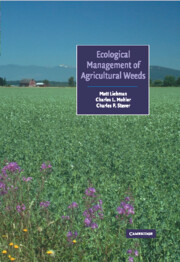Book contents
- Frontmatter
- Contents
- Preface
- 1 Weed management: a need for ecological approaches
- 2 Weed life history: identifying vulnerabilities
- 3 Knowledge, science, and practice in ecological weed management: farmer–extensionist–scientist interactions
- 4 Mechanical management of weeds
- 5 Weeds and the soil environment
- 6 Enhancing the competitive ability of crops
- 7 Crop diversification for weed management
- 8 Managing weeds with insects and pathogens
- 9 Livestock grazing for weed management
- 10 Weed evolution and community structure
- 11 Weed management: the broader context
- Taxonomic index
- Subject index
Preface
Published online by Cambridge University Press: 10 November 2009
- Frontmatter
- Contents
- Preface
- 1 Weed management: a need for ecological approaches
- 2 Weed life history: identifying vulnerabilities
- 3 Knowledge, science, and practice in ecological weed management: farmer–extensionist–scientist interactions
- 4 Mechanical management of weeds
- 5 Weeds and the soil environment
- 6 Enhancing the competitive ability of crops
- 7 Crop diversification for weed management
- 8 Managing weeds with insects and pathogens
- 9 Livestock grazing for weed management
- 10 Weed evolution and community structure
- 11 Weed management: the broader context
- Taxonomic index
- Subject index
Summary
Of the many books that have been written about weed management, most have focused on the use of herbicides. This volume is different. Instead of providing information about chemical weed control technologies, the emphasis here is on weed management procedures that rely on manipulations of ecological conditions and relationships. By focusing on ecologically based methods of management, we have been able to provide in-depth treatment of subjects that most weed science books treat only briefly.
Although the reader will find much information on the ecology of weeds here, the primary purpose of the book is not to explain weed ecology. Rather, our intent is to elucidate the role of ecological principles in weed management. We believe that ecology can provide a theoretical basis for weed science, much as physics provides a theoretical basis for engineering and biology acts as the theoretical basis for medicine. Accordingly, throughout this book we show ways in which insights into ecological processes provide explanations for the successes and failures of weed management and avenues for developing better management strategies.
This volume could be used as a textbook for an advanced course in weed management, but it was not written primarily for that purpose. Rather, we have attempted to offer the reader a critical analysis and synthesis of the literature on ecological weed management and relevant aspects of weed ecology. Several goals motivated this review process. First, we wanted to identify clearly the principles that underlie ecological management practices.
- Type
- Chapter
- Information
- Ecological Management of Agricultural Weeds , pp. ix - xiiPublisher: Cambridge University PressPrint publication year: 2001

